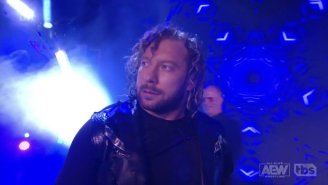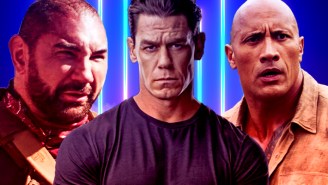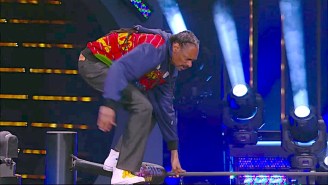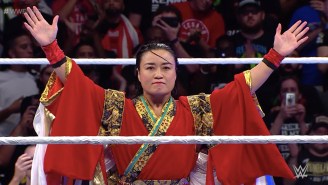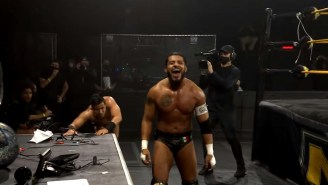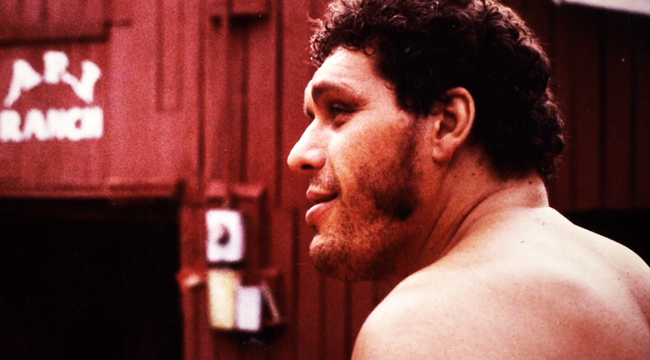
We’ve been covering news of the upcoming Andre the Giant documentary from HBO Films and Bill Simmons since it was first announced, making sure to share all the trailers and updates, hoping that the story of an enormous pro wrestler so famous he’s practically a mythological being would break new ground in the pro wrestling documentary game.
At the top of the film, in the credits, you’ll notice, “In association with WWE,” and that’s key, because this is a very, very pro-WWE product. If you’re a WWE fan (or a regular reader of With Spandex), you know what that means. You’re also probably aware that it’s not a bad thing, really, especially when it comes to video production and documentaries about the company’s superstars. If you’ve ever picked up one of WWE’s spotlight DVDs — highlighting the careers of everyone from Superstar Billy Graham and Dusty Rhodes to Stone Cold Steve Austin and The Rock — you’ve seen the documentary features often included, and you’ve probably loved them. I have, too. I think that’s why I noticed that while it’s an expertly accessible retelling of the Giant’s amazing life, HBO’s Andre the Giant plays so, so much like them.
Andre’s life — his real, real life — almost takes a back seat at times to the spectacle Andre represented. I couldn’t help but compare it to Box Brown’s fantastic graphic novel Andre the Giant Life and Legend, which told the Giant’s story from the beginning, but ping-ponged between his memorable moments in the ring and on film with a series of deeply personal conversations, anecdotes, and relationships. The book spends several pages on how difficult it was for Andre to get to school as a kid. In the documentary, Andre’s early life is breezed through in the first six or seven minutes to get to the pro wrestling documentary classics: an explanation of wrestling terms, an explanation of the territory system, and so on.
The production of the documentary is fantastic, as you’d expect. HBO and WWE are both masters at film production. Everyone you’d want to talk about Andre is there, from the McMahon family to his best friend (and former WWE referee) Tim White to Hulk Hogan and Ric Flair. If you’ve got a cursory interest in Andre as a celebrity, you’re going to be enraptured by this. Stories of Andre’s legendary drinking are many, as you’ve probably clicked on stories about this here and elsewhere because it’s so insane to imagine. Lots of images of how big his hands were, stories of how big his hands were, stuff he could do with his hands.
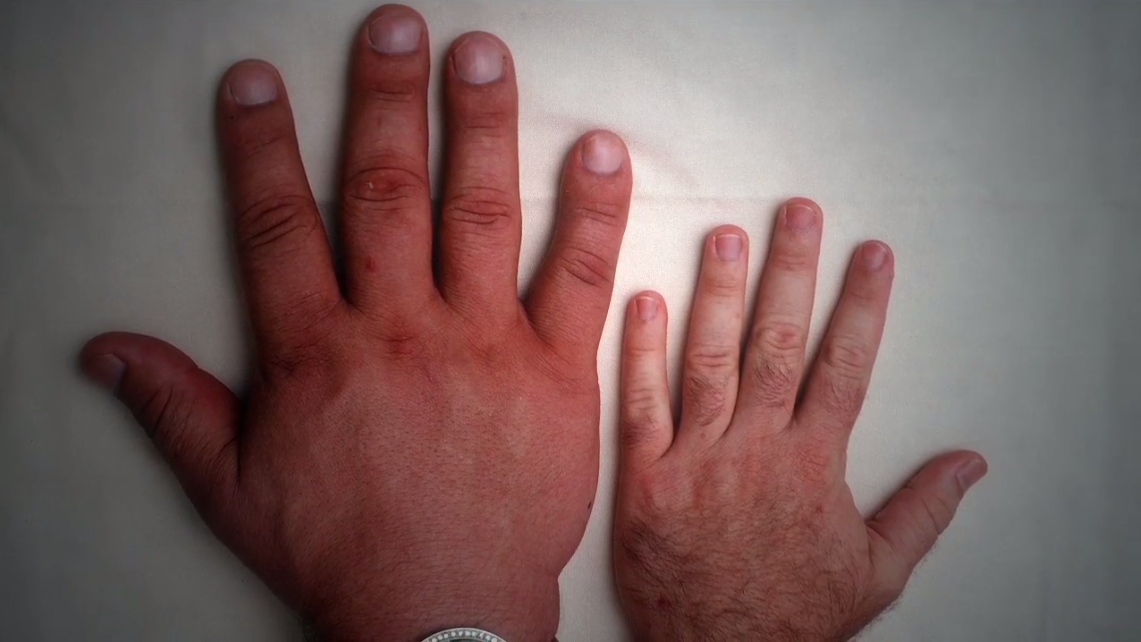
Ric Flair shows up for the first time about 26 minutes in just to make a dick joke. At times, it’s exactly right. It’s maybe never as right as when Vince and Hulk spend about two solid minutes doing impersonations of Andre’s farts.
At the same time, the “winner writes the history” version of WWE storytelling is heavy. Heavy. You’ve got Vince McMahon explaining how he took over the territory system by announcing that his product was “vastly better,” with no argument or even a conversation. It was just accepted as fact. Hulk Hogan’s the guy they go to when it’s time to talk about how Andre hated Macho Man Randy Savage, because of course he is, and at one point the documentary straight-up almost becomes a Hogan doc. They push Andre aside to explain Hulk Hogan, which takes time, but in fairness is somewhat necessary for the non-wrestling fan viewer to grasp the big WrestleMania III part. Hogan is there to talk about himself, wearing a Hogan’s Beach T-shirt. WrestleMania and how great WrestleMania is dominates the second half of the film. Mean Gene Okerlund is there to explain how he’d never seen anything as great as WrestleMania!
Andre the Giant excels when it steps away from the WWE corporate entity and covers what Andre’s day-to-day life was like beyond the general “people laughed at him” and “the world wasn’t made for him” stuff. You can say the world wasn’t made for him because it was hard for him to fit through doorways and into cars, but the spectacle doesn’t become real enough until it’s explained in brutal detail, for example, how Andre couldn’t fit into the bathroom on international flights and had to pee into a bucket behind a curtain. And then the flight attendants had to presumably carry this bucket of Giant urine and dump it in the toilet. Tim White talking about how Andre wanted to be normal-sized, just for a weekend, is heartbreaking.
The doc barely talks to anyone in Andre’s family, because he was away from them so much, and their stories feel a little short. When we meet Andre’s daughter, she’s there for one scene to say she wishes her dad had been around, but she gets why he wasn’t. We hear about Andre flying home to visit his father before he died, but we don’t really know much about their relationship, or what it was like raising a giant teenager, or anything personal. There’s as much time spent with the guy who works at the hotel who discovered his dead body as there is with Andre’s brother and child.
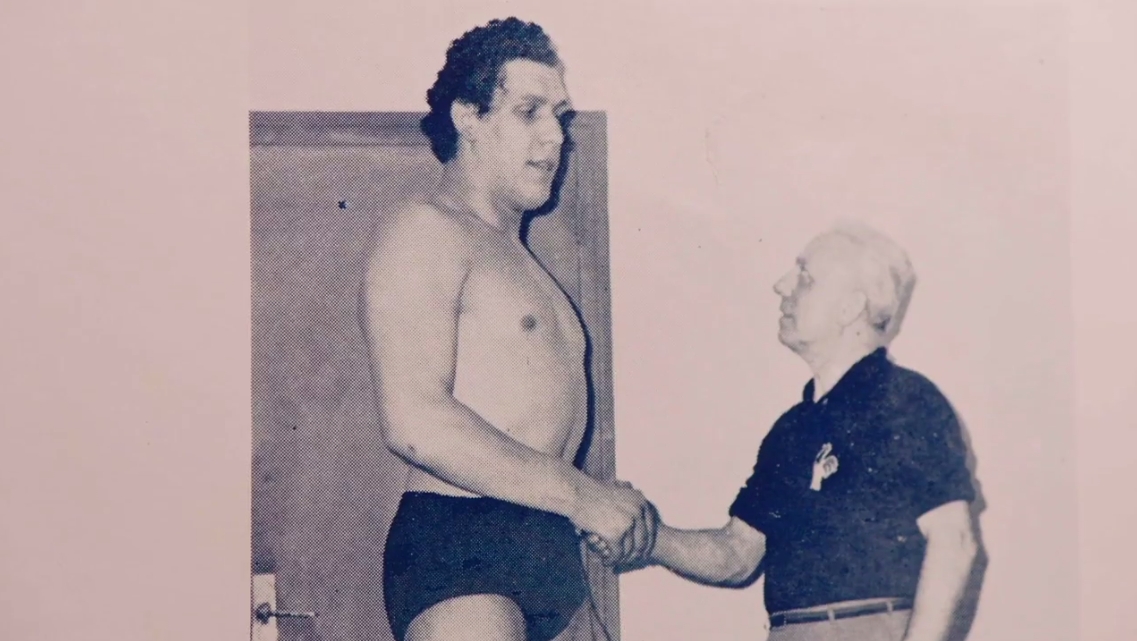
I get it, you know? I’m coming at the documentary from a wrestling fan’s perspective, and wrestling fans new and/or old have spent their entire fandom hearing these stories about Andre the Giant. How big his hands were, how he was the biggest attraction in wrestling, the big gate for WrestleMania, his role in The Princess Bride, and so on. We’ve heard probably a half a dozen versions of the WrestleMania match story from Hulk Hogan, including versions where Andre was 600-plus pounds and died after he got bodyslammed, and there’s another one here. For people who don’t come at this from a wrestling fan’s perspective, or who maybe like wrestling but don’t know much about its history or the stars of the 1980s, it’s probably going to blow your mind. Like discovering a great song for the first time. Andre’s legend is legit, and insane, and just hearing about him drinking over 100 beers from an impressed Ric Flair is enough to make you a fan for life. And that’s what WWE DVD documentaries are for.
I say that not to be sensational or give it a “bad” review, because it’s far from bad. It’s excellent. But Bill Simmons isn’t Errol Morris, and WWE’s got an image to protect, so you’re not going to come away from the film knowing who the man was. You don’t hear anything about the trouble he got into beyond the talking heads saying Andre had a temper and smiling about it, and you don’t hear about his fight with Blackjack Mulligan or his issues with Bad News Brown. It’s very complimentary and safe, and I guess there’s no reason for it not to be.
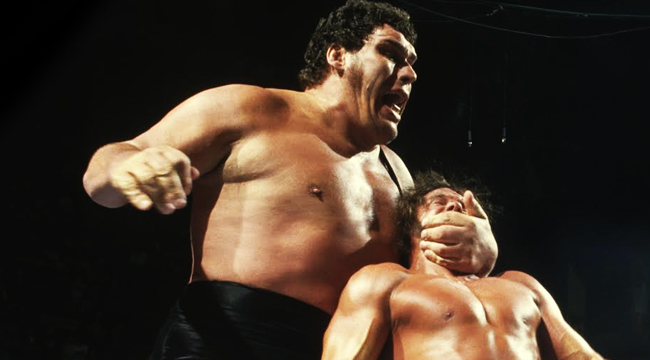
At the end of the day, I went into the documentary expecting to see the story of André René Roussimoff, and I got the story of “Andre the Giant.” It’s still an unforgettable story, and the anecdotes about Andre falling in love with a small town in North Carolina because it reminded him of home, or Tim White breaking down wishing he’d been there for Andre at the end but stopping himself because there’s “no crying in wrestling” make me wish the focus was shifted, just slightly. Andre the Giant is certainly a recommendation, but watch it like you’re hearing the story from Hulk Hogan. Because for the most part, you are.

